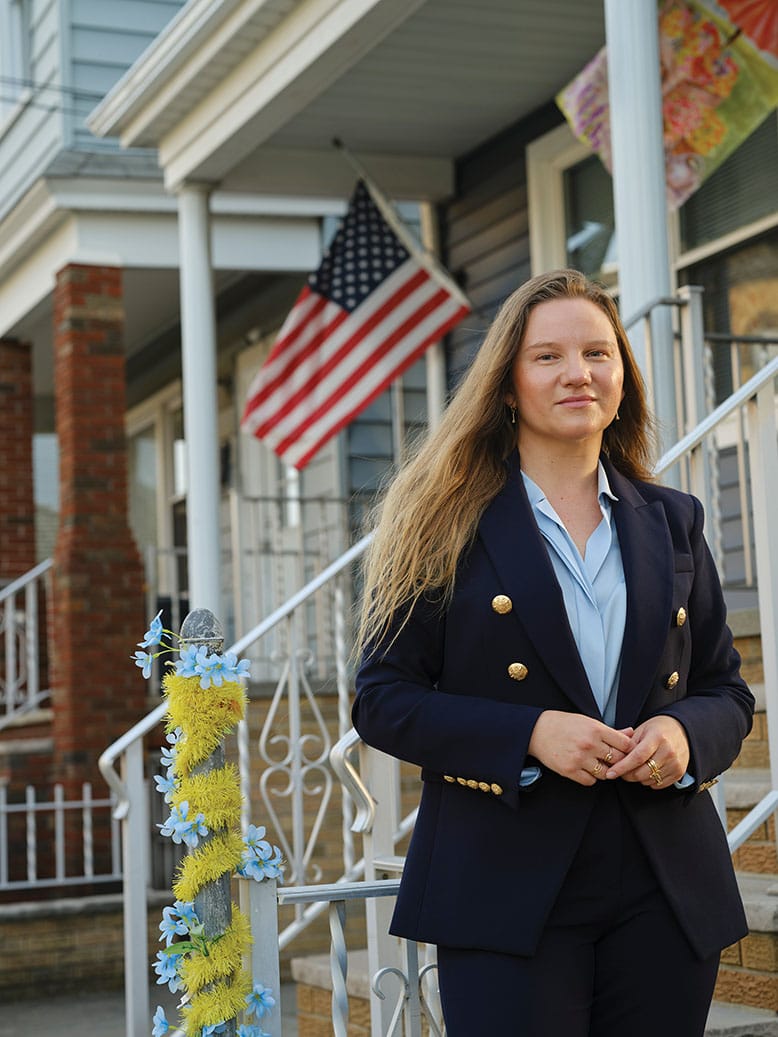
Gintare Grigaite, a Lithuanian immigrant herself who speaks four languages, finds her work “so rewarding.” Photo: Chris Buck
Far from the Southwest border, America’s immigration drama plays out daily in a storefront law office on Broadway in Bayonne. From Ecuador, Bolivia, Mexico, the Dominican Republic and other nations, those who hope for citizenship arrive with legal questions for attorney Gintare Grigaite.
But she asks the first question—in Spanish or one of her three other languages, Lithuanian, Russian and English. “How can I help you?”
By turns problem-solver, confessor and cheerleader, she listens to the stories of asylum seekers, undocumented residents, green card holders, and others anxious to bring family members to this land of opportunity.
Each client has a story and each case is a riddle: How does it fit with the intricate U.S. immigration code, which evolves with each presidential administration and shift in the political wind?
Grigaite & Abdelsayed, the law firm she cofounded in 2012, has grown from its start in Bayonne to include offices in Newark, Union City and New York City.
On a typical morning, a Bolivian couple arrives with their toddler grandson. Their passports contain U.S. tourist visas that are decades out of date. “How handsome you were,” Grigaite jokes as she looks at the grandfather’s photo in the well-thumbed document.
The couple has never returned to Bolivia. Now their two children are college graduates with good jobs and—Grigaite pointed out—U.S. citizens who can sponsor their parents’ application for a change in immigration status.
Next, an Ecuadorian woman who crossed the Southwest border last year with her husband and three children tells Grigaite they all wish to apply for asylum. Does she qualify? She unspools a story of her brother’s murder in Ecuador after gang threats, a crime that resulted in no arrests despite video evidence.
“I will help you,” says Grigaite. The fee: $2,500.
The attorney understands the goals of her clients because she is an immigrant herself.
In Lithuania, a Baltic state that in 1991 became the first Soviet republic to declare independence, her parents sensed their future was uncertain as the Soviet Union broke up and the newly established nations of Eastern Europe realigned. Her mother, a physician, emigrated first, sponsored by an American hospital because of her specialized medical skills. Eventually, Grigaite followed.
Grigaite completed high school in Brooklyn, then received undergraduate and law degrees from St. John’s University in Queens. Her father, a world-class track-and-field athlete who had stayed in Lithuania to manage a sports stadium, died just before she opened her law practice. His photo gazes down on her as she interviews her clients.
The success or failure of her efforts can change lives, Grigaite knows. She has helped dozens of New Jerseyans sponsor Ukrainians fleeing their country after the Russian invasion. Her efforts enabled the mother of the first child born with Zika-virus-related abnormalities in the United States to remain in the country lawfully to care for her disabled daughter.
Recently, she joined another of her clients for his final immigration interview at the central New Jersey office of the Citizenship and Immigration Service.
A drunk driver had plowed into his family’s minivan four years ago during their vacation trip to Niagara Falls, killing his wife, daughter and 4-year-old granddaughter. The 60-year-old suffered a concussion that made learning English and taking a test difficult. Grigaite obtained a medical exemption from the standard citizenship test.
As he awaits his swearing-in ceremony, the moment is bittersweet; the loved ones with whom he would have shared it are gone. Grigaite hugs him. He reciprocates with a rare smile.
“It was so moving to me,” she says afterwards. “This work is so rewarding.”
No one knows New Jersey like we do. Sign up for one of our free newsletters here. Want a print magazine mailed to you? Purchase an issue from our online store.



